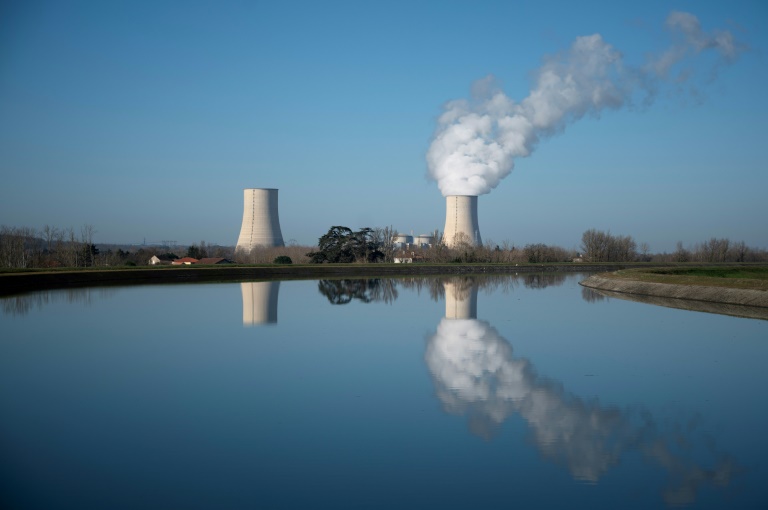Q&A: India seeks ambitious nuclear power program

The European Commission will publish draft plans that could include nuclear energy as part of its ambitious climate targets – Copyright AFP/File Daniel ROLAND
India’s government has recently determined it will undertake a $26 billion investment in its nuclear energy sector. This move signifies a significant shift towards non-carbon-emitting energy sources.
This development is in alignment with the company NANO Nuclear Energy Inc. Their mission to pioneer advanced microreactors and small modular reactors (SMRs) complements India’s ambitious goals to increase clean energy capacity.
To learn more, Digital Journal spoke with Jay Jiang Yu, Founder, and James Walker, CEO of NANO Nuclear Energy, to discuss their thoughts on India’s commitment to nuclear energy and learn more about their own mission with NANO Nuclear.
Digital Journal: What is the significance of India’s announcement?
Jay Jiang Yu: India’s announcement to invite private firms to invest $26 billion in its nuclear energy sector marks a significant shift towards increasing the share of non-carbon-emitting energy sources in the country’s energy mix. This move underscores India’s commitment to achieving its target of having 50% of its installed electric generation capacity sourced from non-fossil fuels by 2030, contributing to global efforts to combat climate change and, more significantly, creating far more energy sovereignty for the country.
DJ: What will this deliver in terms of energy supply?
James Walker: The investment in India’s nuclear energy sector is expected to deliver a substantial increase in energy supply, contributing to meeting the country’s growing electricity demands. With plans to build 11,000 megawatts (MW) of new nuclear power generation capacity by 2040, this initiative will play a crucial role in diversifying India’s energy sources and enhancing energy security.
DJ: How ‘green’ is nuclear energy?
Yu: Nuclear energy is considered a low-carbon or even carbon-neutral energy source as it does not produce carbon dioxide emissions during electricity generation. While nuclear power plants require uranium fuel, the process of nuclear fission does not emit greenhouse gasses like traditional fossil fuel-based power generation methods. In many circumstances, nuclear energy emerges as an even more green energy solution than wind and solar because of the much smaller footprint required to site the plant. Therefore, nuclear energy plays a significant role in reducing greenhouse gas emissions and mitigating climate change.

DJ: What are the objectives of NANO nuclear?
Walker: NANO Nuclear Energy Inc. aims to develop and commercialize advanced microreactors and small modular reactors (SMRs) that offer scalable, cost-effective, and clean energy solutions for both industry and the public. We want to see nuclear energy break into new markets where it has not previously been seen, such as mining sites, remote and island communities, military bases, disaster relief areas, maritime vessels, charging stations for EV vehicles, and powering data and AI centers. Our proprietary technologies are designed to revolutionize the nuclear energy landscape by providing reliable, sustainable, and low-carbon power generation options.
DJ: What are the main technological challenges you face?
Yu: Some of the main technological challenges faced by NANO Nuclear include optimizing reactor designs for safety, efficiency, and scalability, developing innovative fuel cycles to maximize energy output while minimizing waste, and ensuring regulatory compliance and public acceptance of advanced nuclear technologies.
DJ: What are the main societal and political obstacles?
Walker: Societal and political obstacles for NANO Nuclear may include public perception and concerns about nuclear safety, waste management, and potential environmental impacts. Additionally, navigating regulatory frameworks and obtaining necessary permits and approvals for the deployment of advanced nuclear technologies can pose significant challenges. None of these challenges are insurmountable; NANO sees a clear path to realizing its ambitions and becoming an increasing part of the global energy infrastructure.
DJ: Where do you see nuclear power being positioned globally over the next decade?
Yu: Over the next decade, nuclear power is expected to play an increasing role in the global energy mix, particularly as countries strive to reduce carbon emissions and transition to cleaner energy sources. With advancements in technology and increasing recognition of the importance of reliable baseload power, nuclear energy is likely to be positioned as a vital component of the energy transition toward a more sustainable future.
Q&A: India seeks ambitious nuclear power program
#India #seeks #ambitious #nuclear #power #program





